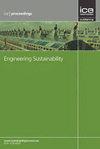阿曼城市固体废物的可持续能源生产
IF 1.5
4区 工程技术
Q3 ENGINEERING, CIVIL
Proceedings of the Institution of Civil Engineers-Engineering Sustainability
Pub Date : 2021-08-10
DOI:10.1680/jensu.21.00040
引用次数: 2
摘要
化石燃料能源生产的不利影响现已在全球范围内得到公认;因此,向可再生能源和可持续能源迈进已成为实现联合国可持续发展目标的重要组成部分。一项比较研究考虑了阿曼的废物发电工厂。采用了一项研究战略,包括定性和定量研究方法,以评估城市固体废物的产生和排放、电力消耗和排放、公众参与废物分类,并估计考虑到阿曼每天5000吨废物转化为能源的工厂所减少的排放量。结果表明,目前满足71 GWh/年电力需求的化石燃料排放量为1.62亿吨co2e /年。同样,220万吨/年的城市固体废物的排放量为340万吨二氧化碳当量/年。一个每天5000吨的废物转化/能源工厂不仅每天产生2.93千兆瓦时,而且每年还能减少246万吨二氧化碳当量。这一倡议将有助于阿曼提高其在能源、气候变化、减少废物和经济增长方面的可持续性绩效,并将为到2030年实现相关可持续发展目标铺平道路。本文章由计算机程序翻译,如有差异,请以英文原文为准。
Sustainable energy production from municipal solid waste in Oman
The adverse impact of the energy production from fossil fuels is now well recognised globally; therefore, the move towards renewable and sustainable energy has become an integral part to achieve United Nations sustainable development goals. A comparative study considered a waste-to-energy plant to produce electricity in Oman. A research strategy including both qualitative and quantitative research methods was adopted to evaluate the municipal solid waste generation and emissions, electricity consumption and emissions, public participation in waste segregation, and to estimate the reduction in emission considering a 5000 t/day waste-to-energy plant in Oman. The results showed that current emissions from fossil fuels to meet the electricity requirement of 71 GWh/year is 162 MtCO2e/year. Similarly, the emissions from 2.2 Mt/year of municipal solid waste is 3.4 MtCO2e/year. A 5000 t/day waste-to/energy plant would not only produce 2.93 GWh daily but would also enable an annual reduction of 2.46 MtCO2e. Such an initiative would help Oman to improve its sustainability performance in energy, climate change, waste reduction and economic growth and will pave the road to achieve the relevant sustainable development goals by 2030.
求助全文
通过发布文献求助,成功后即可免费获取论文全文。
去求助
来源期刊

Proceedings of the Institution of Civil Engineers-Engineering Sustainability
ENGINEERING, CIVIL-ENGINEERING, CIVIL
CiteScore
3.70
自引率
16.70%
发文量
44
审稿时长
>12 weeks
期刊介绍:
Engineering Sustainability provides a forum for sharing the latest thinking from research and practice, and increasingly is presenting the ''how to'' of engineering a resilient future. The journal features refereed papers and shorter articles relating to the pursuit and implementation of sustainability principles through engineering planning, design and application. The tensions between and integration of social, economic and environmental considerations within such schemes are of particular relevance. Methodologies for assessing sustainability, policy issues, education and corporate responsibility will also be included. The aims will be met primarily by providing papers and briefing notes (including case histories and best practice guidance) of use to decision-makers, practitioners, researchers and students.
 求助内容:
求助内容: 应助结果提醒方式:
应助结果提醒方式:


